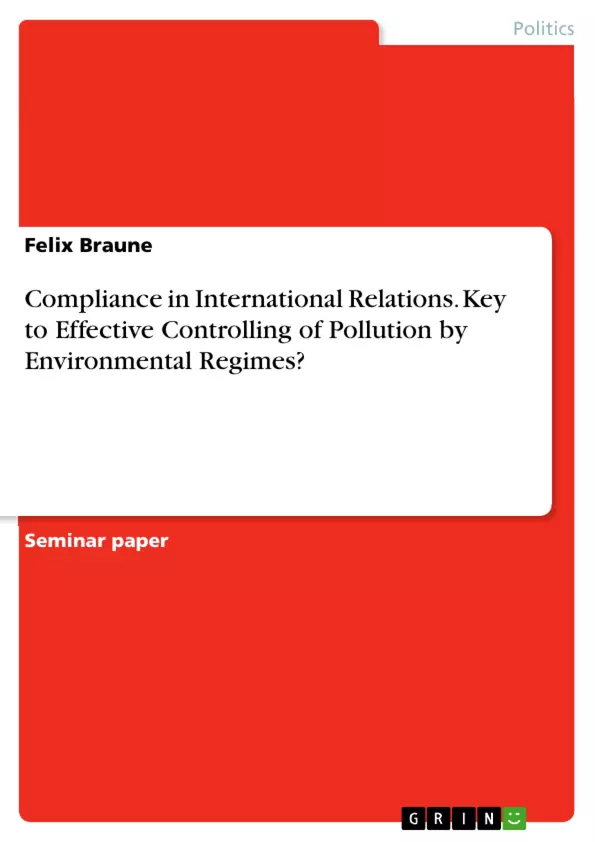This paper will describe the importance of compliance in the ever-more complex international relations, discuss the effectiveness of sub-regimes and their importance to enforce the control of common goods, such as pollution of the seas.
Analyzing international relations with the focus on compliance of actors with regimes or sub-regimes to control a common good is becoming more and more interesting, not only because over a very short period of time (compared to world history) all resources on this planet are becoming more and more rare, but also because every political actor in this anarchic world system can use, pollute, destroy, save or ignore it, with basically no real control mechanism.
The paper is going to use two well know theories to analyze compliance and effectiveness of international regimes or regulations. The institutional approach will be used to discuss whether it is more likely for actors to comply or not and under which circumstances the level of compliance is high enough to turn an international regime into a useful and effective instrument to regulate and control a certain behavior. The theory of realism will be used to analyze the likelihood of compliance and effectiveness of international regimes from a realist's point of view.
The two theories will be compared regarding the most coherent explanation of likelihood of compliance and its influence on the effectiveness of the sub-regimes OILPOL and MARPOL, which were created to control oil pollution of the seas. Which theory can best explain the effectiveness and the likelihood of compliance with these two sub-regimes?
Afterwards, compliance of actors with sub-regimes in the scope of the control and protection of common goods will give a detailed view on the problem of pollution of the seas, followed by a brief conclusion.
Inhaltsverzeichnis (Table of Contents)
- Introduction
- The key role of Compliance in international relations, especially for the effectiveness of international environmental regimes.
- International regimes from a realist perspective
- International regimes in an institutional approach
- International environmental regimes to control oil pollution: OILPOL and MARPOL. Which regime was successful and more effective?
- Conclusion and Outlook
- Sources
Zielsetzung und Themenschwerpunkte (Objectives and Key Themes)
This paper explores the significance of compliance in international relations, particularly within the context of international environmental regimes. It examines how compliance contributes to the effectiveness of these regimes in controlling the pollution of common goods, using the example of oil pollution of the seas. The paper utilizes both a realist and institutionalist approach to analyze the likelihood of compliance and its impact on the effectiveness of international regimes.
- The importance of compliance in international relations
- The effectiveness of sub-regimes in enforcing the control of common goods
- The role of realism and institutionalism in explaining compliance and effectiveness
- The comparison of OILPOL and MARPOL as examples of international environmental regimes
- The impact of compliance on the control and protection of common goods
Zusammenfassung der Kapitel (Chapter Summaries)
The introduction highlights the increasing complexity of international relations and the growing importance of compliance in ensuring the effectiveness of international agreements. It emphasizes the need to analyze compliance with international regimes, particularly in relation to the control of common goods, such as the pollution of the seas.
Chapter 2 delves into the concept of international regimes, defining them as systems of norms and rules established through multilateral agreements between states. It explores the role of compliance in the effectiveness of these regimes and the factors influencing the level of compliance among actors.
Chapter 3 examines the effectiveness of two international environmental regimes, OILPOL and MARPOL, designed to control oil pollution of the seas. It analyzes their compliance levels and effectiveness using both realist and institutionalist approaches, aiming to determine which theory best explains their success.
Schlüsselwörter (Keywords)
The primary focus of this paper is on compliance and its impact on the effectiveness of international environmental regimes. Key themes include international relations, common goods, pollution control, environmental regimes, realism, institutionalism, OILPOL, MARPOL, and the effectiveness of international agreements.
Frequently Asked Questions
Why is compliance important in international environmental regimes?
Compliance is crucial because it determines whether international agreements effectively lead to the protection of common goods, such as the prevention of sea pollution.
What is the difference between the realist and institutionalist views on regimes?
Realism views regimes through the lens of state power and national interest, while institutionalism focuses on how shared norms and rules can facilitate cooperation despite anarchy.
What are OILPOL and MARPOL?
These are international sub-regimes created specifically to control and regulate oil pollution of the seas by ships.
Which theory better explains the success of environmental regimes?
The paper compares both theories to see which provides a more coherent explanation for the likelihood of compliance and the overall effectiveness of OILPOL and MARPOL.
What challenges exist in controlling "common goods"?
Common goods like the oceans are difficult to regulate because any political actor can use or pollute them in an anarchic system with limited control mechanisms.
- Quote paper
- Felix Braune (Author), 2015, Compliance in International Relations. Key to Effective Controlling of Pollution by Environmental Regimes?, Munich, GRIN Verlag, https://www.grin.com/document/307182



